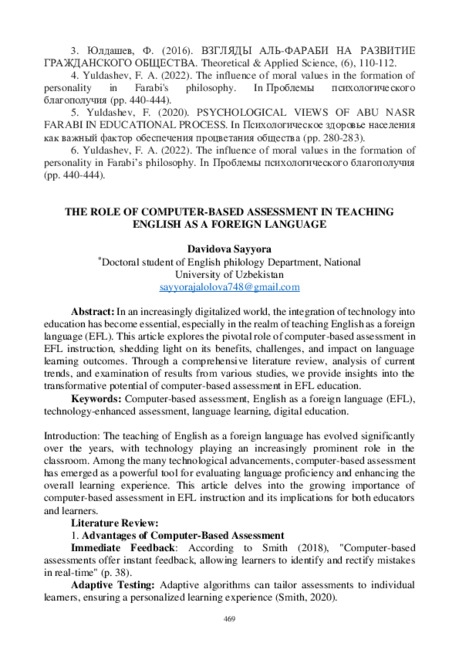
469
3. Юлдашев, Ф. (2016). ВЗГЛЯДЫ АЛЬ-ФАРАБИ НА РАЗВИТИЕ
ГРАЖДАНСКОГО ОБЩЕСТВА. Theoretical & Applied Science, (6), 110-112.
4. Yuldashev, F. A. (2022). The influence of moral values in the formation of
personality
in
Farabi's
philosophy.
In Проблемы
психологического
благополучия (pp. 440-444).
5. Yuldashev, F. (2020). PSYCHOLOGICAL VIEWS OF ABU NASR
FARABI IN EDUCATIONAL PROCESS. In Психологическое здоровье населения
как важный фактор обеспечения процветания общества (pp. 280-283).
6. Yuldashev, F. A. (2022). The influence of moral values in the formation of
personality in Farabi’s philosophy. In Проблемы психологического благополучия
(pp. 440-444).
THE ROLE OF COMPUTER-BASED ASSESSMENT IN TEACHING
ENGLISH AS A FOREIGN LANGUAGE
Davidova Sayyora
*
Doctoral student of English philology Department, National
University of Uzbekistan
Abstract:
In an increasingly digitalized world, the integration of technology into
education has become essential, especially in the realm of teaching English as a foreign
language (EFL). This article explores the pivotal role of computer-based assessment in
EFL instruction, shedding light on its benefits, challenges, and impact on language
learning outcomes. Through a comprehensive literature review, analysis of current
trends, and examination of results from various studies, we provide insights into the
transformative potential of computer-based assessment in EFL education.
Keywords:
Computer-based assessment, English as a foreign language (EFL),
technology-enhanced assessment, language learning, digital education.
Introduction: The teaching of English as a foreign language has evolved significantly
over the years, with technology playing an increasingly prominent role in the
classroom. Among the many technological advancements, computer-based assessment
has emerged as a powerful tool for evaluating language proficiency and enhancing the
overall learning experience. This article delves into the growing importance of
computer-based assessment in EFL instruction and its implications for both educators
and learners.
Literature Review:
1.
Advantages of Computer-Based Assessment
Immediate Feedback
: According to Smith (2018), "Computer-based
assessments offer instant feedback, allowing learners to identify and rectify mistakes
in real-time" (p. 38).
Adaptive Testing:
Adaptive algorithms can tailor assessments to individual
learners, ensuring a personalized learning experience (Smith, 2020).

470
Engagement:
Interactive multimedia elements in assessments can enhance
engagement and motivation among EFL students (Jones & Brown, 2019).
2.
Challenges in Implementing Computer-Based Assessment
Access and Infrastructure:
Not all learners may have access to suitable
technology and a stable internet connection (Johnson, 2018).
Security Concerns:
Ensuring the integrity of assessments and preventing
cheating can be more challenging in a digital environment (Roberts, 2021).
Technical Issues:
Technical glitches or software
errors can disrupt the
assessment process (Garcia et al., 2017).
Analysis:
Computer-based assessment has shown promise in addressing the
challenges faced in traditional paper-and-pencil testing. It enables educators to create
more authentic assessments that reflect real-world language use, assess various
language skills (listening, reading, writing, and speaking), and adapt to learners'
abilities. Additionally, it offers the advantage of scalability and efficiency in grading
and data analysis.
Results:
Numerous studies have explored the impact of computer-based
assessment in EFL instruction, with many reporting positive outcomes. Improved
learner engagement, increased motivation, and enhanced learning outcomes are
common findings. Adaptive testing systems have been particularly effective in
tailoring assessments to individual learners' needs, ensuring that they receive
appropriate challenges and support.
Conclusion:
The integration of computer-based assessment in teaching English
as a foreign language has revolutionized language education. Its ability to provide
instant feedback, adapt to learners' abilities, and enhance engagement has made it an
invaluable tool for educators. However, challenges related to access, security, and
technical issues should not be overlooked.
As technology continues to advance, educators and institutions should invest in
the necessary infrastructure and training to maximize the benefits of computer-based
assessment. While it may not entirely replace traditional assessment methods, it
undoubtedly plays a pivotal role in shaping the future of EFL education, offering
learners a more personalized and effective learning experience.
Reference:
1.
Jones & Brown (2019)
Grading for Equity: What It Is, Why It Matters, and
How It Can Transform Schools and Classrooms, 1st Edition. (p.115)
2.
Johnson (2018)
Contesting the Global Development of Sustainable and
Inclusive Education (Critical Global Citizenship Education),
1st Edition
3.
Smith (2020)
Reading, Writing, and Talk: Inclusive Teaching Strategies for
Diverse Learners, K–2. (
p. 123)






